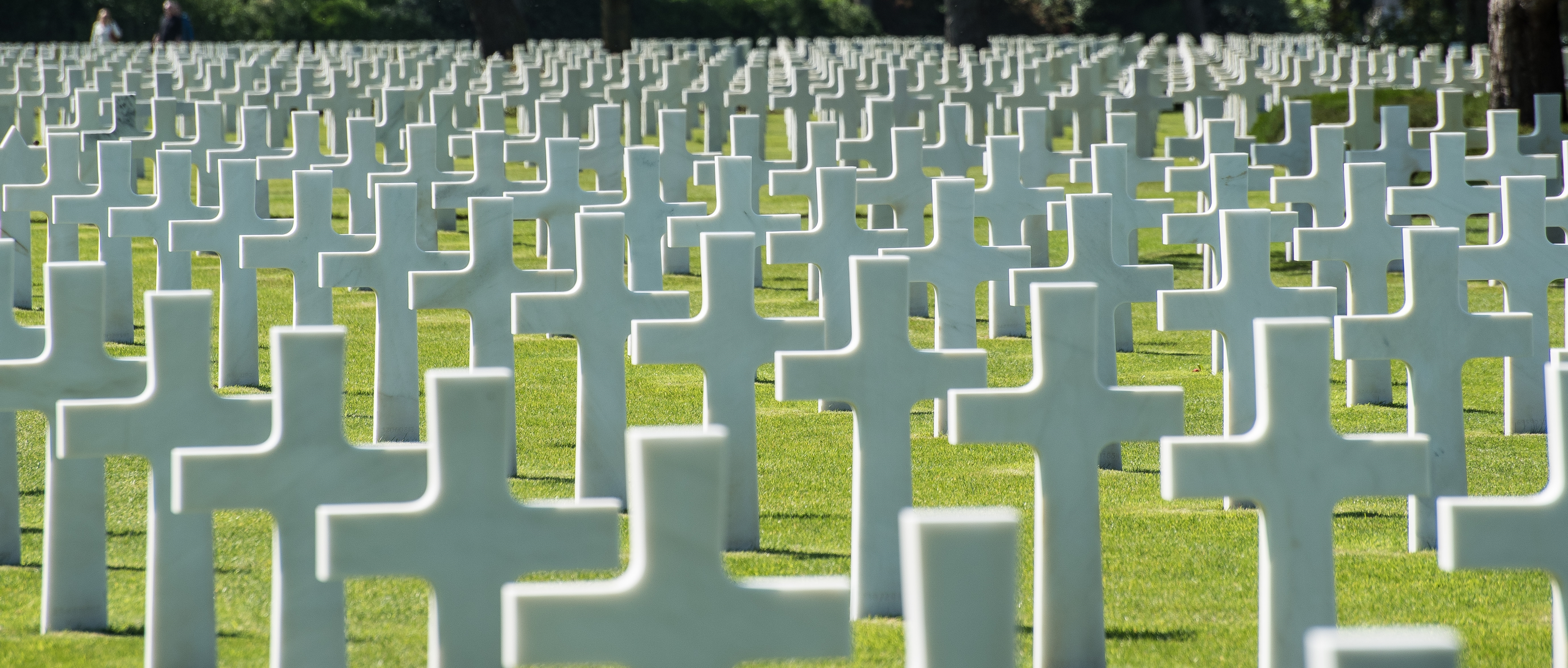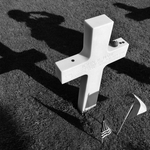Colleville-sur-Mer
Genesis 28:12, and the most beautiful place on Earth
I would like to dedicate this post to one very specific, very special place in Normandy. It is a place where I have lived some of the most emotional moments of my life; somewhere that brings strangers together for a few moments, as the weight of life and death is pressed upon their hearts, while they walk among its marble markers and plush green grass. There is nowhere in the world quite like the Normandy American Cemetery at Colleville-sur-Mer, or as i like to call it: Colleville.
First off, there is only one way to get into Colleville, at least if you're coming by car. That is through the main entrance, which is preceded by a long and elegant drive between two thick rows of Norman trees, whose big green leaves soften the sunlight as you reach the gate. Once through the gate, it feels as if you've entered a portal situated between two worlds. When you get out of your car, if you shut your eyes, you can hear the wind whistle through the trees and the distant, high-pitched voices of young French students on an end-of-school year field trip to the American cemetery. From the parking lot, it's only a minute's walk past the visitor center, before you arrive at the final stretch that leads you into the cemetery. When emerging from that last corner, one is received with the stunning view of the English Channel, with its slate-gray body and stern horizon. During major anniversary years, that final stretch towards the cemetery is sometimes lined with soldiers, whose duty it is to stand vigil. With each step toward the Channel, the anticipation grows; the emotions bellow. The presence of 9,388 souls starts to hum inside your chest, and the breeze feels a little warmer than anywhere else in the world. "They're here," you whisper to yourself, "they never left."
The walk towards the Channel, and onward to the cemetery.
Nothing can prepare you for the wave of emotions that crashes down upon you when you see that very first cross, in the very first section, as it appears on your left. But it isn't that first cross that makes the tears swell in your eyes, it's the next one, and another, and the one after that... When finally, you make it past the “Spirit of American Youth Rising from the Waves” statue, and direct your gaze fully to the left, away from the Channel, that's when you see deep into that Sea of Stars and Crosses. There is no other word to describe it: it is a sea. A white, marble sea, which holds within its massive 172.5 acres the stories of generations of shattered families and the tears shed by mothers for their sons who would never return; those "buried with their comrades"; or those left behind because their families were too poor to repatriate them. A sea, which every visitor navigates differently. And, despite the crushing sadness with which one is submerged upon discovering "the Boys"-- beauty prevails, always. The beauty of the blue skies and white clouds, which float above Colleville, ever so elegant. The beauty of the birdsong coming from the trees. The snow-white markers, whose immobility makes them look like angels, standing proudly together, knowing their sacrifice served humanity. It is then that "thank you for your service" takes on its truest meaning.

Small pathways lead visitors down toward the markers. I always felt as if I needed to be very quiet while walking toward the markers, and then onto the grass. I was worried somehow that I would wake the soldiers from their eternal rest. But they stand there, perfectly aligned, sentinels of peace, anchored deep in the same French soil upon which they lived their final moments. Their spirits still glow when the sun hits them on the right angle; their voices ring out, ever so subtly, between two joyful twitters from a robin, perched high upon a branch. But then, as you get closer to the marker, close enough to read the name engraved into the sandy white marble, it's as if the soldier reaches out, hand outstretched, and says: "Hey, how you doin'? I'm George." And suddenly, as you read where he's from, the unit he served with, his rank, and the day he died, a feeling of familiarity grows within you, like you've come to visit an old friend. So you lay your hand upon the marker, like it's his shoulder. Thank you. He winks, smiles and nods at you. So, you move on.
It's overwhelming.
There aren't enough hours in a day to visit every marker and spend an adequate amount of time with each soldier. As you make your way toward the back of the cemetery and as your feet grow tired and your legs get heavy, maybe you walk quicker. Perhaps, you read the names a little faster. And, when you finally reach the benches at the very rear of the cemetery, you stop and turn around. From a distance, the statute at the entrance that seemed so huge when you first made your way in, now seems no larger than a pinhead. Truly, there is no place in the world that I have been where both serenity and sadness collide so gracefully to remind you of how small one life can be and the impact that such a small life can make on the world, when great men are called to do what is right.
Looking back the way you came after reaching the rear of the cemetery, past all those lives sacrificed, and all those stories interrupted by evil, there is only one feeling that wraps itself around your soul and squeezes tightly: peace. Peace, like the sleep of a newborn baby. Peace, like the silence during prayer at church. Peace, for which all those lives were traded, all those years ago. When we say "He made the ultimate sacrifice for freedom," those words should never be spoken lightly. Each one should be weighed with the gravitas it deserves, for that sacrifice was not made in vain, and it cost someone everything.
Finally, at closing time, somewhere far away, three salvos of seven shots ring out in unison, and then you hear a single note, the very first of the twenty-four notes played during Taps. It soars above the early evening buzz and funnels all attention to its solemn tone. You stand straight, like the markers that surround you, and place your hand upon your heart, which beats hard with pride. The American Flag slowly descends the flagpole, and is carefully retired. Taps comes to an end. "Time to leave," for you, perhaps, but not for them; not for "The Boys." They'll be here tomorrow, and the day after, and when you come back someday with your children, or your grandchildren. For their watch began the day they died, and like the salvos and like the bugle, it will echo on forever into history.
I've made my best attempt at describing Colleville with words. And, as I reread my work, I am humbled by how much is left to be said, that I could never say, for words, no matter how well formulated, cannot describe the experience of walking on that sacred ground. All there is left for me to say, is this:
Should the day ever come, should I be so worthy that I am allowed into heaven, I believe that first I will make that walk, from the back of the American Cemetery at Colleville-sur-Mer, to the foot of “The Spirit of American Youth Rising from the Waves.” I believe that during that long walk, on my way to Heaven's Gate, all those angels will walk beside me, and when I set my foot upon the first of the marble steps which will lead me to my Salvation, that robin will fly, the sun will glow, the bugle will sound, and the angels will stand beside me to welcome me into their home.
He had a dream in which he saw a stairway resting on the earth, with its top reaching to heaven, and the angels of God were ascending and descending on it.
Genesis 28:12
I promise to remember.




